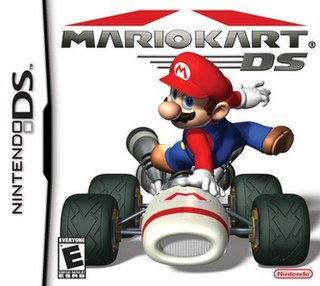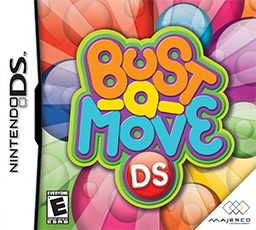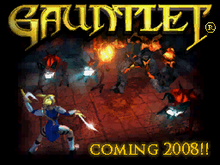
Super Mario Kart is a kart racing game developed and published by Nintendo for the Super Nintendo Entertainment System (SNES). The first game in the Mario Kart series, it was released in Japan and North America in 1992, and in Europe the following year in 1993. Selling 8.76 million copies worldwide, the game went on to become the fourth best-selling SNES game of all time. Super Mario Kart was re-released on the Wii's Virtual Console in 2009, on the Wii U's Virtual Console in 2013, and on the New Nintendo 3DS's Virtual Console in 2016. Nintendo re-released Super Mario Kart in 2017 as part of the company's Super NES Classic Edition.

A Boy and His Blob: Trouble on Blobolonia is a puzzle-platform game developed by Imagineering and published by Absolute Entertainment for the Nintendo Entertainment System (NES). The video game was released in North America in 1989, in Europe by Nintendo in 1991 and in Japan by Jaleco in 1991. A Boy and His Blob follows an unnamed male protagonist and his shapeshifting blob friend on their adventure to save the planet of Blobolonia from the clutches of an evil emperor.

Super Mario 64 DS is a 2004 platform game developed and published by Nintendo for the Nintendo DS. It was a launch game for the DS. Super Mario 64 DS is a remake of the 1996 Nintendo 64 game Super Mario 64, with new graphics, characters, collectibles, a multiplayer mode, and several extra minigames. As with the original, the plot centers on rescuing Princess Peach from Bowser. Unlike the original, Yoshi is the first playable character, with Mario, Luigi, and Wario being unlockable characters in early phases of the game.

Metroid Prime Hunters is a 2006 action-adventure game developed by Nintendo Software Technology and published by Nintendo for the Nintendo DS. It was released in North America in March 2006, with other territories later. The story takes place in between the events of Metroid Prime and Metroid Prime 2: Echoes. Players assume the role of series protagonist Samus Aran, who investigates a mysterious message that originated from the Alimbic Cluster and comes into contact with a legion of bounty hunters.

Mario Kart DS is a 2005 kart racing video game developed and published by Nintendo for the Nintendo DS handheld game console. It was released in November 2005 in North America, Europe, and Australia, and on December 8, 2005, in Japan. The game was re-released for the Wii U's Virtual Console in North America and PAL regions in April 2015 and in Japan in May 2016. The game is the fifth main entry in the Mario Kart series of video games, and the first to be playable via the Nintendo Wi-Fi Connection online service. Like other games in the series, Mario Kart DS features characters from the Mario series and pits them against each other as they race in karts on tracks based on locations in the Mario series.

Tetris DS is a puzzle video game developed and published by Nintendo. It was released for the Nintendo DS on March 20, 2006, in North America, April 13, 2006, in Australia, April 21, 2006, in Europe, and April 27, 2006, in Japan. An installment of the Tetris franchise, the game supports up to ten players locally, and supported online multiplayer of up to four players using Nintendo Wi-Fi Connection prior to its discontinuation.

Bionicle Heroes is a 2006 video game published by Eidos Interactive and TT Games Publishing and based on Lego's Bionicle line of constructible action figures. The game was released in November 2006 on PlayStation 2, Xbox 360, GameCube, Microsoft Windows, Game Boy Advance, and Nintendo DS; a Nintendo Wii version was later released in April 2007. The home console and PC versions were developed by Traveller's Tales, while Amaze Entertainment developed the handheld versions. A version of the game for mobile phones, developed by Universomo, was also released. The home console and PC versions of the game are third-person shooters, while the Game Boy Advance version is a run 'n' gun shoot 'em up and the Nintendo DS version is a first-person shooter. The story of Bionicle Heroes, where the player seeks to liberate the island of Voya Nui and its inhabitants from the villainous Piraka, is not canon to the official Bionicle story.

Bust-a-Move DS, known as Pullback!! Puzzle Bobble in Japan, is a puzzle video game developed by Happy Happening and published by Majesco Entertainment for the Nintendo DS handheld video game console.

Cake Mania is a cooking time management video game developed and published by Sandlot Games in 2006. Some ports of Cake Mania have different titles; the Wii version is known as Cake Mania: In the Mix!, and the PlayStation 2 and PlayStation Portable versions are titled Cake Mania: Bakers Challenge. Cake Mania received mixed reviews from critics, with some reviewers praising the game's 'addictive' and 'simple' casual gameplay, while others criticized this as being 'repetitive' and 'shallow'.

Mario Kart Wii is a 2008 kart racing game developed and published by Nintendo for the Wii. It is the sixth installment in the Mario Kart series, and was released in April 2008. Like its previous installments, Mario Kart Wii incorporates playable characters from the Mario series, who participate in races on 32 different race tracks using specialized items to hinder opponents or gain advantages. The game features multiple single-player and multiplayer game modes including two- to four-person split screen. Online multiplayer was supported until the discontinuation of Nintendo Wi-Fi Connection in May 2014. Mario Kart Wii uses the Wii Remote's motion-controls to provide intuitive and conventional steering controls. Each copy of the game was bundled with the Wii Wheel accessory to augment this feature and mimic a steering wheel.

Kingdom Hearts 358/2 Days is an action role-playing video game developed by h.a.n.d. and Square Enix in collaboration with Disney Interactive Studios for the Nintendo DS. It is the fifth installment in the Kingdom Hearts series, and takes place near the end of the first game in parallel to Kingdom Hearts: Chain of Memories, leading directly into the events of Kingdom Hearts II. The game was released worldwide in 2009. The story is told from the perspective of Roxas, and follows his daily life within Organization XIII and his relationship with fellow Organization member Axel; it also introduces a fourteenth member, Xion, who befriends them.

Tomb Raider: Underworld is an action-adventure video game developed by Crystal Dynamics and published by Eidos Interactive for Windows, PlayStation 3, Xbox 360, Wii and Nintendo DS in November 2008. Later versions were released for mobile in December 2008, PlayStation 2 in 2009, and OS X in 2012. Various companies ported or developed the different versions. The ninth overall entry in the Tomb Raider series and third in the Legend trilogy, Underworld follows archaeologist-adventurer Lara Croft as she searches for Mjolnir, an artefact key to entering the realm of Helheim, while confronting adversaries from her past. Gameplay features Lara navigating levels set across the world through platforming, fighting enemies and solving puzzles to progress.

Space Invaders Extreme is a re-vamped incarnation of the classic arcade game Space Invaders. The DS and PSP versions were released to mark the 30th anniversary of Space Invaders which saw its original arcade release in 1978. An HD version of the game has been remastered by Backbone Entertainment for Xbox Live Arcade with new four-player multiplayer modes and visualizer backgrounds by Jeff Minter, it was released on 6 May 2009 as a wrap-up to the 30th anniversary. The game is played at a fast pace with an electronic soundtrack and sound effects.

Blood Bowl is a 2009 fantasy sports video game developed by Cyanide, loosely based on gridiron football, and adapted from the board game of the same name, which is produced by Games Workshop, using the CRP ruleset. It was released for Microsoft Windows, Xbox 360, Nintendo DS, PlayStation Portable, iOS, and Android.

Tetris Party is a puzzle video game by Hudson Soft for WiiWare. An installment of the Tetris series, the game supports the use of Miis and the Wii Balance Board, and features both local and online multiplayer in addition to several single-player modes unique to the game.

G.I. Joe: The Rise of Cobra is a video game adaptation of the 2009 movie of the same name. The game takes place after the movie. The Xbox 360, PlayStation 3, Wii, PlayStation 2, and PSP versions are similar, while the DS version and the mobile phone versions are different.

Majesco Entertainment Company is an American video game publisher and distributor based in Hazlet, New Jersey. The company was founded as Majesco Sales in Edison, New Jersey in 1986, and was a privately held company until acquiring operation-less company ConnectivCorp in a reverse merger takeover, becoming its subsidiary and thus a public company on December 5, 2003. ConnectivCorp later changed its name to Majesco Holdings Inc. on April 13, 2004.

Club Penguin was a media franchise that was created in 2005 with the release of the online massively multiplayer online game (MMO) Club Penguin, later bought out by Disney. Club Penguin inspired a variety of console video games, books, and television specials. Following the game's discontinuation in March 2017, the game was replaced by a successor, Club Penguin Island (2017), which was released on mobile and desktop, and an unlicensed recreation, Rewritten (2017). However, Island was discontinued in November 2018, while Rewritten was ordered shut down by Disney in April 2022, effectively ending the franchise.

Toon-Doku is a 2007 sudoku puzzle video game developed by Dragon's Den Unlimited and published by Majesco Entertainment for the Nintendo DS. Directed by Joseph Sutton, the game was first released in North America and Europe in April 2007, with an Australian release following in October later the same year.
Operation: Vietnam is a tactical shooter developed by Coyote Developments Ltd and published by Majesco Entertainment and Eidos Interactive for Nintendo DS in 2007.





















